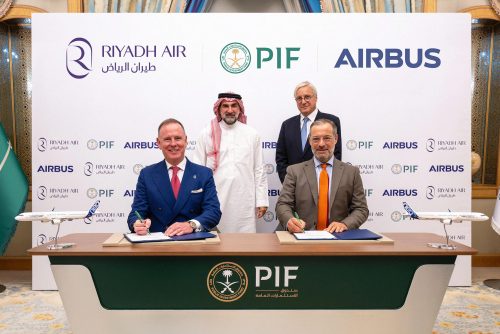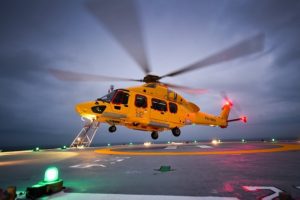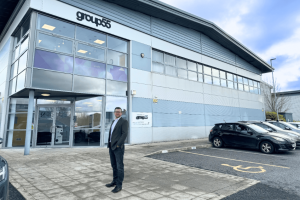Sales improve but earnings fall for Airbus, as new Saudi carrier places major order

Aircraft manufacturer, Airbus, has seen revenues increase in the nine months to September, 30, 2024, although adjusted EBIT declined.
The group, which employs around 4,500 staff at its wing-making plant at Broughton near Chester, and several thousand staff in Filton, near Bristol, also announced that Riyadh Air, the new premium international airline based in Saudi Arabia, has placed a firm order for 60 A321neo (new engine option) family aircraft.
The consolidated financial results for the nine months period revealed a five per cent increase, year-on-year, to €44.5bn.
A total of 497 commercial aircraft were delivered, up from 488 in the same period last year, comprising 45 A220s, 396 A320 family, 20 A330s and 36 A350s.
Revenues generated by Airbus’s commercial aircraft activities increased four per cent, mainly reflecting the higher number of deliveries.
Airbus Helicopters’ deliveries totalled 190 units (197 units in 2023) with revenues rising five per cent, reflecting a more favourable mix in programmes and a solid performance in services.
Revenues at Airbus Defence and Space increased seven per cent year-on-year, mainly driven by the Air Power business, partly offset by the previous Estimate at completion updates in Space Systems. Five A400M military airlifters were delivered, against four a year ago.
Consolidated EBIT (earnings before interest and tax) Adjusted totalled €2.798bn (2023: €3.631bn).
EBIT Adjusted related to Airbus’s commercial aircraft activities decreased to €3.028bn (2023: €3.216bn), with the increase in deliveries being reduced by investments for preparing the future.
Consolidated EBIT (reported) amounted to €2.690bn (2023: €2.712bn), including net Adjustments of € -108m.
The financial result was € -92m (2023: €231m), mainly reflecting negative impacts from the interest result and revaluation of financial instruments, partially offset by the positive impact from the revaluation of certain equity investments. Consolidated net income was €1.808bn (2023: €2.332bn) with consolidated reported earnings per share of €2.29 (2023: €2.96).
Consolidated free cash flow before customer financing was € -845m (2023: €1.104bn), mainly reflecting the change in working capital, notably the inventory build-up that supports fourth quarter deliveries and the ramp-up across programmes.
Consolidated free cash flow was € -877m (2023: €843m). The gross cash position stood at €21.1bn at the end of September 2024 (year-end 2023: €25.3bn), with a consolidated net cash position of €7.2bn (year-end 2023: €10.7bn).
Gross commercial aircraft orders totalled 667 (2023: 1,280 aircraft) with net orders of 648 aircraft after cancellations (2023: 1,241 aircraft).
The order backlog amounted to 8,749 commercial aircraft at the end of September 2024.

An Airbus H175 helicopter used in oil and gas industry
Airbus Helicopters registered 308 net orders (2023: 191 units), including 43 heavy helicopters from the Super Puma Family. Airbus Defence and Space’s order intake by value increased to €11bn (2023: €8.5bn), reflecting good momentum across the division.
The A220 programme continues towards a monthly production rate of 14 aircraft in 2026, with a focus on financial performance.
The A320 family programme continues to ramp up towards a rate of 75 aircraft per month in 2027.
In late October, the first A321XLR was delivered. On widebody aircraft, the company is now stabilising monthly A330 production at around rate four. On the A350, the company continues to target rate 12 in 2028 and is actively managing specific supply chain challenges that may have an impact on the programme’s ramp-up trajectory, in particular in 2025.
On the A400M programme, development activities continue towards achieving the revised capability roadmap.
Retrofit activities are progressing in close alignment with the customer. No further net material impact was recognised in the first nine months of 2024.
As the basis for its 2024 guidance, the company assumes no additional disruptions to the world economy, air traffic, the supply chain, the company’s internal operations, and its ability to deliver products and services. Its 2024 guidance is before M&A.
On that basis, the company targets to achieve in 2024, around 770 commercial aircraft deliveries, EBIT Adjusted of around €5.5bn and free cash flow before customer financing of around €3.5bn.

Guillaume Faury
Chief executive, Guillaume Faury, said: “We saw strong demand across our product range in the first nine months of the year.
“The nine month earnings reflect the level of commercial aircraft deliveries, a solid performance in helicopters and the charges in our space business recorded in the first half.
He added: “We are constantly adapting to a complex and fast changing operating environment marked by geopolitical uncertainties and specific supply chain challenges that have materialised in the course of 2024.
“We remain focused on our priorities, including ramping up commercial aircraft deliveries and transforming our Defence and Space division.”
Airbus said its board will propose to the shareholders at the 2025 Annual General Meeting the renewal of Guillaume Faury as cxecutive member of the board and Airbus chief executive.
The order for 60 A321neo family aircraft with Riyadh Air was signed at the Future Investment Initiative (FII) in Riyadh, marking a significant milestone for Riyadh Air.
The signing ceremony was attended by His Excellency Yasir Al-Rumayyan Governor of the Public Investment Fund (PIF) and Chairman of Riyadh Air, Tony Douglas, CEO of Riyadh Air, Christian Scherer, Chief Executive, Commercial Aircraft at Airbus and Benoit de Saint-Exupery, Executive Vice President Sales of the Commercial Aircraft business.
Tony Douglas said: “This investment will not only enable us to support economic growth in the aviation industry, it will ensure Riyadh Air operates one of the most fuel efficient fleets. It’ll be instrumental in helping Saudi Arabia achieve its decarbonisation goals.
“This deal strongly reinforces the positive economic impact of Saudi Arabia’s newest airline on both a global and local scale to facilitate the fast-growing Saudi aviation ecosystem.”
Christian Scherer said: “We are proud to welcome Riyadh Air as a new Airbus customer and partner. The latest generation A321neo aircraft will bring exceptional efficiency to the airline’s operations, concrete contributions to its decarbonisation goals and comfort to its passengers.
“We look forward to working together to support the strong ambitions of Saudi aviation.”
The A321neo is the largest member of Airbus’s best-selling A320neo family. To date more than 6,700 A321neo have been ordered by more than 90 customers across the globe.








